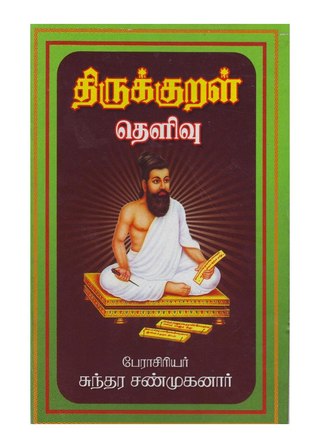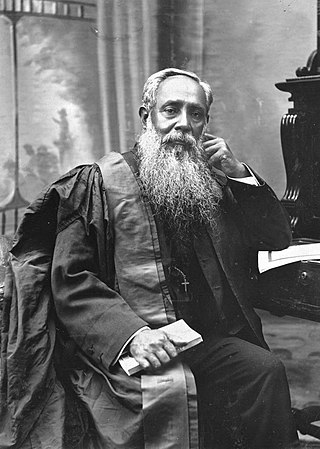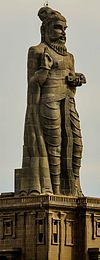
The Central Institute of Classical Tamil (CICT) is a body established by the Government of India with a view to promoting the cause of Classical Tamil. It is located in Chennai.

The Tirukkuṟaḷ, or shortly theKural, is a classic Tamil language text consisting of 1,330 short couplets, or kurals, of seven words each. The text is divided into three books with aphoristic teachings on virtue (aram), wealth (porul) and love (inbam), respectively. Considered one of the greatest works ever written on ethics and morality, it is widely acknowledged for its universality and secular nature. Its authorship is traditionally attributed to Valluvar, also known in full as Thiruvalluvar. The text has been dated variously from 300 BCE to 5th century CE. The traditional accounts describe it as the last work of the third Sangam, but linguistic analysis suggests a later date of 450 to 500 CE and that it was composed after the Sangam period.
Tirukkural, also known as the Kural, an ancient Indian treatise on the ethics and morality of the commoner, is one of the most widely translated non-religious works in the world. Authored by the ancient Tamil poet-philosopher Thiruvalluvar, it has been translated into at least 42 world languages, with about 57 different renderings in the English language alone.

John Lazarus (1845–1925) was a Christian missionary to India who rendered the Tirukkural into English. He revised the work of his predecessor William Henry Drew, who had already translated the first 63 chapters of the Tirukkural, and translated the remaining portion of the Kural text.

Tirukkural remains one of the most widely translated non-religious works in the world. As of 2014, there were at least 57 versions available in the English language alone. English, thus, continues to remain the language with most number of translations available of the Kural text.

Latin is the first foreign language into which the Tirukkuṟaḷ was translated. There are three known translations of the Kural text available in Latin.
Hindi perhaps has many translations of the Tirukkural. As of 2000, there were at least 19 translations of the Kural text available in Hindi. Many of these translations are in verse form.
Kannada has at least eight translations of the Tirukkural available as of 2014. Both prose and verse translations have been made in Kannada.
Malayalam has seen the most number of Tirukkural translations than that of any other language in India. As of 2007, there are at least 21 translations of the Kural text available in Malayalam. Malayalam also has the distinction of producing the first ever translation of the Kural text among the languages in India and the world at large. The Annual Report of the Cochin Archeological Department for the year 1933–34 reported an unpublished manuscript of a Malayalam translation of the Tirukkural made in 1595.
As of 2015, there were at least three Gujarati translations available of the Tirukkural.
As of 2015, Tirukkural has been translated into Rajasthani only once.
As of 2015, Tirukkural has been translated into Punjabi at least twice.
Herbert Arthur Popley was a Christian missionary of London Mission, Erode, known for his literary work as a translator of the Tirukkural and his skill in rendering Tamil Christian music in the Carnatic style. He was secretary of the All-India Y.M.C.A. At the time of his death, he was president of the local Y.M.C.A. and a director of the Coonoor Co-operative Urban Bank Ltd. He died in Coonoor on 9 May 1960 at the age of 81.
Charles Edward Gover (1835–1872) was a British folklorist in Madras, India. He was one of the earliest translators of the Tirukkural into English.
A. Chakravarti, who served the Indian Educational Service (IES), was a professor of philosophy at the Presidency College in Chennai, India. He is known for translating the Tirukkural into English.
P. S. Sundaram (1910–1998), born Pazmarneri Subrahmanya Sundaram, was an Indian professor of English, best known for translating the Tirukkural and various Tamil classics into English. He had degrees in English from the University of Madras and the Oxford University. He served as professor of English for about 40 years in different parts of North India.
E. S. Ariel, also referred to as Monsieur Ariel by his contemporaries, was a 19th-century French translator known for his French translation of the ancient Indian philosophical text of the Tirukkural. He translated select couplets of the Tirukkural into French in 1848 and published it in Paris under the title Kural de Thiruvalluvar . Although the first French translation of the Kural text was made by an unknown author in 1767, which Ariel had mentioned in his work, it was Ariel's translation that brought the ancient work to the French world.
Soibam Rebika Devi is an Indian translator who is best known for translating the Tirukkural into Meitei.
S. Srinivasan is an Indian civil engineer, who is best known for translating the Tirukkural into Kannada.
Tarlochan Singh Bedi is an academician better known for translating the Kural into Punjabi.






